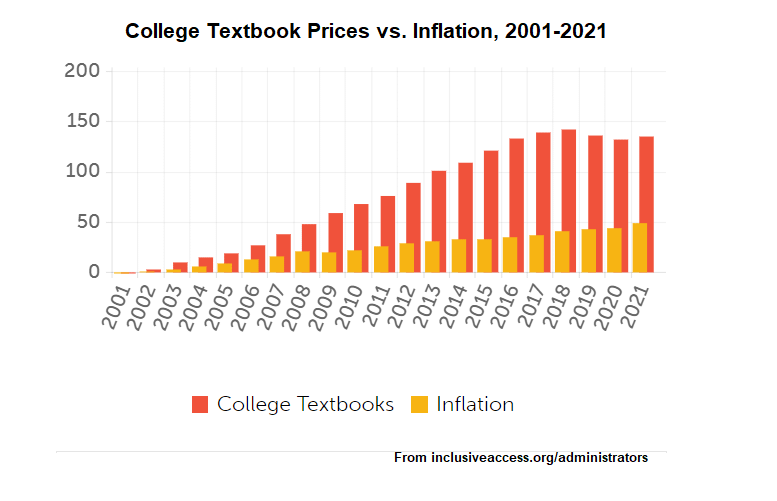
Helping Contain Student Costs
 As regular readers of Library Matters may recall, the SU Libraries have for a few years now bought textbooks for selected courses and put them on reserve to help students who couldn’t afford the high prices charged by many textbook publishers. We continue to try to help students with textbook costs, but we are now pursuing a different strategy.
As regular readers of Library Matters may recall, the SU Libraries have for a few years now bought textbooks for selected courses and put them on reserve to help students who couldn’t afford the high prices charged by many textbook publishers. We continue to try to help students with textbook costs, but we are now pursuing a different strategy.
Textbook prices have increased at a much faster rate than inflation, as can be seen in the graph. Most publishers are for-profit companies and naturally seek to maximize their profits – good for their shareholders but not so good for students. For example, they have discouraged students from buying used books by frequently publishing new editions and by including access cards to related online resources that are only good for one semester and are not transferable.
The SU Bookstore is, of course, on the front lines of textbook costs. It has done its best for students by encouraging Inclusive Access (IA), a program that publishers started offering a few years ago. In IA, universities sign agreements with publishers. When faculty assign books offered as IA, the university adds the cost of the book to the students’ university bills, collecting the money for the publishers. The system has advantages for students, primarily 1) they get access from the beginning of the semester to the e-book and 2) financial aid can cover it. Typically, the agreements with publishers set the IA price as 15-20% less than the cost of the print version of the book. Initially, IA prices were low, but some publishers have now started raising the prices of the print books to astronomical levels, causing the IA prices to rise. A check of the top 50 courses by enrollment at SU for fall 2022 showed that many IA textbooks are nearing $100; the most expensive was an applied calculus textbook for $142.25. Since the vast majority of these courses are now using IA and the Libraries are not able to buy and share IA textbooks with borrowers, we did not end up buying any new textbooks to put on course reserve for fall 2022.
So ... what are we doing to try to help students with textbook costs? We are encouraging faculty either to:
- assign e-books we own that allow unlimited concurrent users (many only allow one or two users at a time, so they are not appropriate for course use), or
- create and/or use course materials that are Open Educational Resources (OER).
OER, according to the Cape Town Declaration of 2007, are “teaching, learning and research materials in any medium, digital or otherwise, that reside in the public domain or have been released under an open license that permits no-cost access, use, adaptation and redistribution by others with no or limited restrictions.” OER have been around for more than 20 years, but it has taken a while for knowledge about them and for their use to become widespread. And, to be honest, they also have improved over that period to the point where many now are rigorously peer-reviewed and provide many of the ancillary materials – homework problems, quizzes, etc. – that commercial publishers provide. OER are free to use and also allow the faculty great control. Faculty are free to mix and match OER from different creators for their courses; they can re-write sections; and they can adapt them to suit their students by, for example, changing data, images and the like to be related to Delmarva or some other interest shared by their students. Or they can create wholly new OER themselves.
Some Salisbury University faculty have long been using OER and have created OER. Various faculty have won grants from the Maryland Open Source Textbook (MOST) Initiative to create, revise and publish OER. Brandye Nobiling for HLTH 230, Zachary Townsend for FTWL 106 and Rebecca Anthony for SOWK 309 are recent SU awardees. Led by Jessica Clark, the assistant provost for faculty success, SU won a 2022 MOST Institutional OER Grant.
The SU Libraries are supporting and encouraging SU’s OER efforts in several ways. Our librarian liaisons are able to help faculty who want to use OER find suitable materials. We maintain an OER LibGuide to provide information about OER and links to major OER resource sites and tools. We subscribe to Faculty Select, a tool that helps people find OER textbooks or e-books that could be used for courses. And we will be participating in the faculty training and other activities that occur with the MOST Institutional OER Grant.